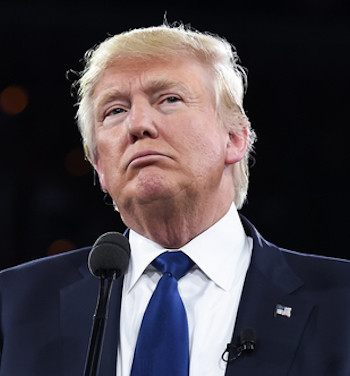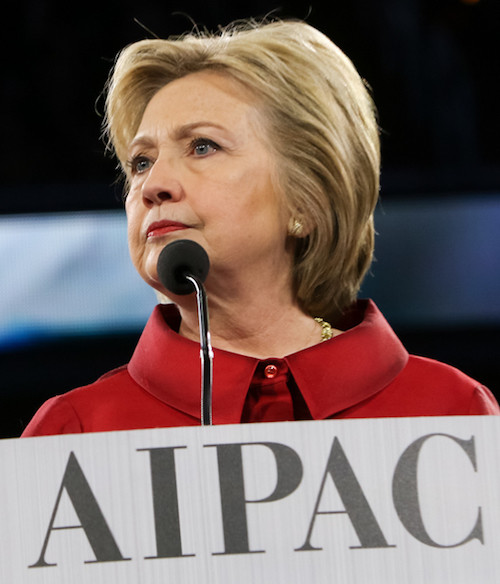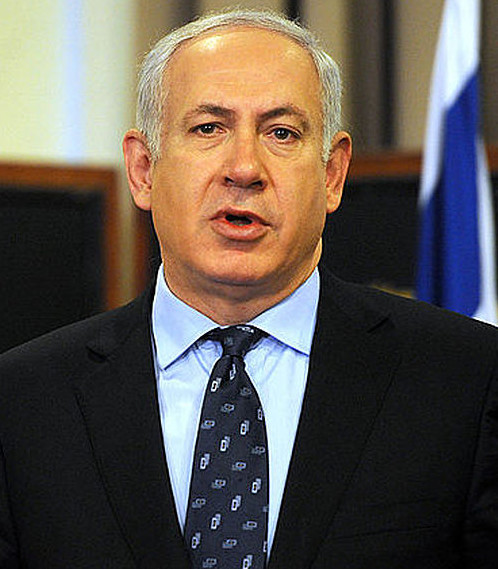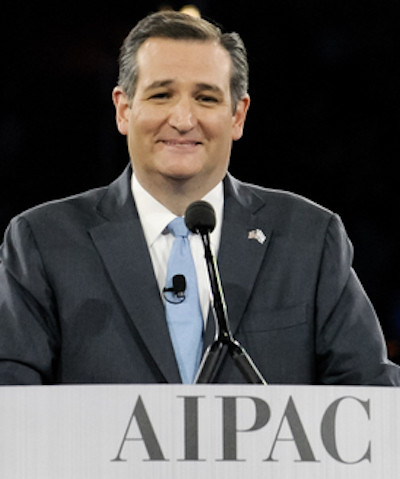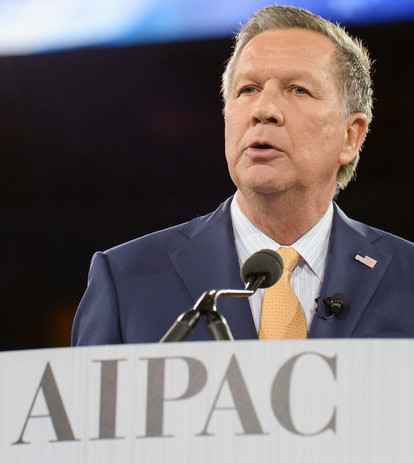At AIPAC, Bibi and pols pump the faithful
More than 18,000 supporters of Israel, from nearly every political, geographic and religious orientation, ascended on Washington this week for the annual American Israel Public Affairs Committee (AIPAC) policy conference.
AIPAC’s biggest event yet was a chance for the Jewish state’s best American friends to learn and exchange ideas, pump up their enthusiasm, and return home ready to fight the good fight for another year.
Four-thousand students were in attendance, including hundreds from day schools, yeshivot and public schools in the Long Island area.
Four of the five remaining presidential candidates delivered powerful pro-Israel messages: Donald Trump, Ted Cruz, Hillary Clinton and John Kasich (pictured at right speaking at AIPAC). Bernie Sanders, campaigning out west, declined to travel to Washington to appear.
The closer for the three-day event was New Jersey Senator Bob Menendez. He reminded the cheering throng in the Walter E. Washington Convention Center that while the Holocaust “is central to Israel’s identity,” it is not the reason for its existence.
“The true justification is written in thousands of years of undeniable history … going back to the time of Abraham and Sara,” he said. “There can be no denying the Jewish people their legitimate right to live in peace and security in a homeland to which they have a connection for thousands of year.”
Menendez followed a live video address by Israeli Prime Minister Benjamin Netanyahu, who spoke from Jerusalem as grim details were emerging of the morning’s terror attacks in Brussels.
“This is one continuous assault on all of us,” Netanyahu said.
“In all these cases, the terrorists have no resolvable grievances. It’s not as if we can offer them Brussels, or Istanbul, or even the West Bank … because what they seek is our utter destruction and their total domination.
“Their basic demand is that we should basically disappear. Well my friends, that’s not going to happen.”
Calling Israel an “island of liberty” in a sea of instability, Netanyahu said the Jewish state should be “a great cause of liberty that unites Americans” rather than dividing them.
Netanyahu affirmed his own commitment to “two states, for two peoples, in which a demilitarized Palestinian state finally recognizes the Jewish state.”
Acknowledging that “there’s some skepticism about my views on this,” he added, “Here’s the acid test: I’m ready to begin such negotiations immediately, without preconditions. Anytime, anywhere. That’s a fact. But [Palestinian Authority] President [Mahmoud] Abbas is not ready to do so. That’s also a fact. There’s political will here, in Jerusalem; there’s no political will there, in Ramallah.”
As for a seemingly widening of anti-Israel sentiment around the world, Netanyahu said that he was “confident over time that the trend of embracing Israel will overcome the trend of maligning Israel, because ultimately, freedom beats tyranny, and ultimately, when vigorously defended, truth beats lies.”
In a much-anticipated speech on Monday, Republican presidential primary front-runner Donald Trump said that dismantling the “disastrous” Iran nuclear deal would be his top priority as president. Trump also un-veiled a three-pronged strategy for dealing with Iran, offering the type of detailed policy talk that many critics have accused him of leaving out of previous speeches.
The speech was unusual for Trump, since he read prepared remarks from a TelePromp-Ter and delivered few off-the-cuff snaps.
Some delegates left the conference center to protest Trump’s appearance; others cheered. Trump earned a standing ovation on Monday for saying, “President [Barack] Obama in his final year. Yay.”
That reaction embarrassed AIPAC leaders, and its new president, Lillian Pinkus, expressed “great offense” toward Trump’s rhetoric.
“While we may have policy differences, we deeply respect the office of the president of the United States and our president, Barack Obama,” said Pinkus, whose emotion was palpable.
“There are people in our AIPAC family who were deeply hurt last night,” she said, lamenting that “so many applauded a sentiment that we neither agree with or condone.”
“Let us close this conference in recognition that when we say, ‘Come ‘Together” [this year’s AIPAC conference tagline] we still have a lot to learn from each other, and we still have much work to do, because broadening the base of America’s pro-Israel movement and unity is our strength.”
Trump ended his speech on a light note, expressing pride that his daughter Ivanka, who is married to Jewish real estate developer Jared Kushner, “is about the have a beautiful Jewish baby.”
“In fact,” Trump said, “it could be happening right now, which would be very nice as far as I’m concerned.”
Democratic presidential candidate Hillary Clinton, in a speech Monday morning, said that she is a “steady” alternative to Trump when it comes to Israel and the Middle East.
“We need steady hands. Not a president who said he’s neutral on Monday, pro-Israel on Tuesday, and who knows what on Wednesday,” Clinton said, referring to Trump’s recent comments that he would be a “neutral” peace broker in the Israeli-Palestinian conflict. Trump’s Republican rivals also targeted those remarks.
Clinton also used her AIPAC speech to condemn Trump for encouraging violence and “playing coy” with white supremacists.”
Referencing the upcoming holiday of Purim, Clinton said Queen Esther “refused to say silent in the face of evil,” and so should Americans.
“Neutrality helps the oppressor, never the victim,” she said, quoting Holocaust survivor Elie Wiesel. “Silence encourages the tormentor, never the tormented.”
Republican Sen. Ted Cruz, who spoke immediately after Trump, promised AIPAC he would “unapologetically”back Israel.
He mocked Trump’s use of the term “Palestine” in the preceding speech. “Palestine” has not existed since 1948, Cruz said.
Cruz said he would rip the “catastrophic” Iran nuclear deal to shreds, move the American embassy in Israel to Jerusalem, and veto any U.N. resolution that imposes an Israeli-Palestinian conflict settlement on Israel.
Republican Gov. John Kasich used a significant portion of his speech to tout his ties to the Jewish community, including his relationship with the late Gordon Zacks, an influential Ohio Jewish businessman and Republican activist; his advocacy for the release of famed refusenik Natan Sharansky from Soviet prison; and his work on establishing the state of Ohio’s official Holocaust memorial.
Kasich called his support for Israel “firm, and unwavering for more than 35 years of my professional life.” The governor, who formerly served on the U.S. House Armed Services Committee for 18 years, noted that during that time “we assured Israel’s qualitative military edge by offering the initial $10 million” for the Iron Dome missile defense system.
The governor called the current wave of Palestinian terror in Israel “the outcome of a culture of death that the Palestinian Authority and its forebears have promoted for over 50 years,” slamming Palestinian school textbooks that are filled with “vile anti-Semitism,” PA stipends for imprisoned terrorists, and the Palestinians’ naming of public squares and streets after terrorists.
Look for more coverage of the AIPAC policy conference in next week’s edition of The Jewish Star.

 47.0°,
Fair
47.0°,
Fair 